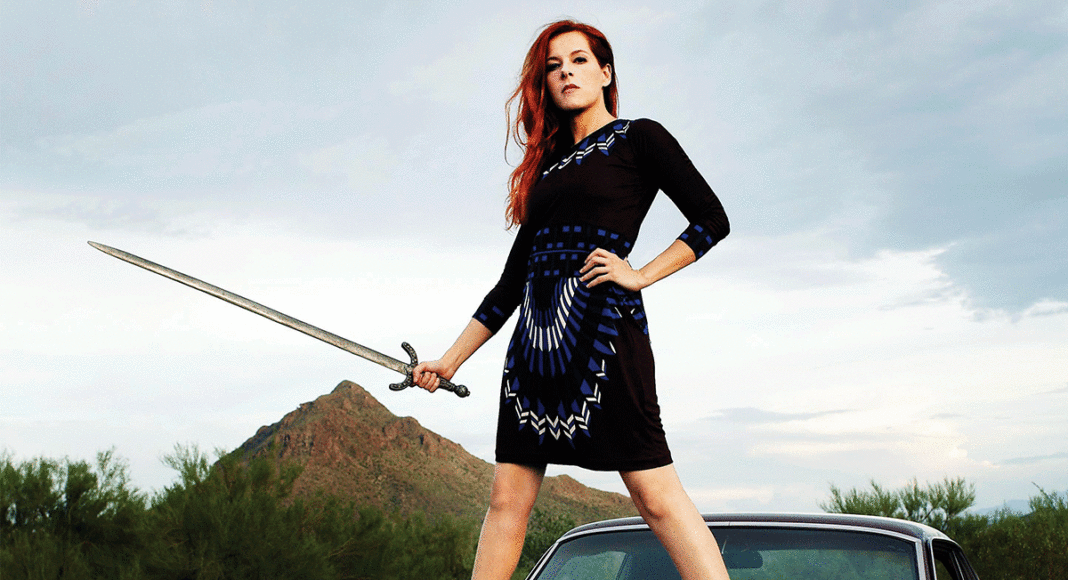Singer-songwriter Neko Case is known now for her gorgeously heady music, but back in her early days, it was her fists that made an impression on Larry Livermore. In his autobiography How to Ruin a Record Label, the founder of the legendary Bay Area punk imprint Lookout Records describes fleeing a club in fear one night in the ’90s when he thought Case was going to put them through his face.
When I ask Case about it, I discover she didn’t know she was mentioned in Livermore’s book—and I can practically hear her rolling her eyes through the phone.
“I don’t really know Larry Livermore,” she says. “I’m sure compared to the community he hung around with, I was a little more—I don’t know, what’s the word—outgoing.”
Does she agree with his assessment of her punk young self as a “tough customer?”
“No, I was just the boss of myself,” she says.
She kind of had to be. Born in Alexandria, Virginia to parents who soon divorced, Case moved around a lot with her mother and stepfather before leaving home as a teenager. She ended up in Tacoma, Washington, where the music scene gave her the support she didn’t have at home.
“I didn’t really have parents, so I got into the punk scene early, like around 14,” she says. “Going into record stores and hanging out, that’s where you met other people.”
With the internet still years away, there was a whole different way of relating to music. “The actual record store was the chat room, and it happened in real time, in real life,” she says. “You’d see other people there who you thought looked cool, and they were wearing a cool T-shirt, and you wanted to talk to them—and felt shy, but eventually you’d make friends. It just kind of became a community.”
If the scene made an impression on her, she definitely made an impression on it, as proven by the 1990 song “Neko Loves Rock ’n’ Roll,” by Tacoma band Girl Trouble. But by 1993, she had moved to Vancouver and was performing with the “cuddlecore” band Cub, which is probably most remembered by those outside the scene for releasing the song “New York City” that would be famously covered by They Might Be Giants. (It is also remembered by Larry Livermore as the band Case was in when she terrified him during one of their tours through California. Does he realize he was lucky not to be the guy she actually punched one night while Cub was playing in Houston?) She was hired as a replacement drummer, but Cub is how Case got her first-ever experience singing on stage, and led to her forming the trio Meow.
What’s remarkable is maybe not that she found punk, but what she got out of it. For one thing, although she started out in all-girl bands, some of the groups she admired taught her a different lesson about gender roles in rock ’n’ roll.
“I really loved the Minuteman. It had a lot to do with the fact that they weren’t a boy band or a girl band or whatever the hell you want to call it,” she says. “They just were for people who thought about stuff. It wasn’t macho or feminine, they were well balanced. It was a thinking person’s punk band.”
That same ethos was reflected in the New Pornographers, the Vancouver band which features Case’s songs and vocals, but also those of fellow members A.C. Newman and Dan Bejar. The group seemed to become an instant indie-rock favorite upon the release of their 2000 debut, Mass Romantic, and Case has remained connected to it even after finding fame with her solo work.
Considering all this history, it seems a bit ridiculous now that Case was pegged as an alt-country performer when her first solo record, The Virginian, came out in 1997. Certainly it was her most honkytonk-esque record—and her connection to country and Western does stretch all the back into her childhood, when her grandmother used to play it for her—but even then, at the same time that she was covering Loretta Lynn, she was also covering Queen.
Thankfully, these days no one seems as determined to force a classification onto her sound, especially after the trio of haunted but kinetic records she’s made in the last 10 years: 2006’s Fox Confessor Brings the Flood, 2009’s Middle Cyclone and 2013’s The Worse Things Get, The Harder I Fight, The Harder I Fight, The More I Love You. Critics and fans are now more focused on her songwriting, which walks a line between desperately emotional and downright mysterious. She doesn’t mind that people read so many (sometimes pretty out-there) things into her lyrics; she deliberately writes them to leave room for interpretation.
“My intention is often to get people engaged in the story, and maybe be able to put themselves in the story, because that’s what I really love in other people’s songwriting,” she says. “A lot of classic pop songs are written about things that are as popular as love or whatever, but they don’t give you a time or place, and they remain kind of magical somehow. Unfortunately, I’m a little wordier than somebody like Cole Porter, so mine are definitely little black holes of stories, little rabbit holes of stories.”
Neko Case plays at 8 p.m. on Tuesday, Nov. 15 at the Rio Theatre in Santa Cruz. Tickets are $37.50, available at Tomboy and at riotheatre.com.













